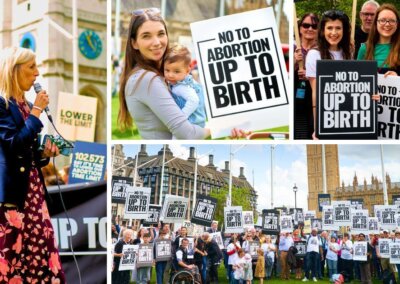The UK is facing the biggest Parliamentary battle in a generation as MPs are set to vote on a number of proposed changes to abortion legislation on 15 May.
Earlier today, the Leader of the House of Commons, Penny Mordaunt MP, announced that Report Stage of the Criminal Justice Bill will take place on Wednesday 15 May. A number of abortion-related amendments to the Bill have been tabled.
MPs will likely be given the opportunity to vote on two pro-life changes to the law: one amendment tabled by Caroline Ansell MP to lower the abortion time limit from 24 weeks to 22 weeks; and another tabled by Sir Liam Fox MP that would bring the abortion time limit for babies with Down’s syndrome in line with the time limit for babies that do not have disabilities. Abortion for Down’s syndrome is currently legal right up to birth.
MPs will also likely have the opportunity to vote on two extreme abortion up to birth amendments that have been tabled by pro-abortion MPs Stella Creasy and Diana Johnson.
Ansell amendment (NC15)
A cross-party group of 41 MPs, led by Caroline Ansell MP, have come together to table the Gestational Time Limit Reduction amendment to the Criminal Justice Bill ahead of Report Stage of the Bill on 15 May.
This amendment will change the law to lower the abortion time limit from 24 weeks to 22 weeks.
It will do this by amending the Abortion Act 1967 and the Infant Life (Preservation) Act 1929 so that the gestational time limit for abortion that is set out in Section 1(1)(a) of the Abortion Act is lowered from 24 to 22 weeks.
A 24-week abortion limit is past the point at which many babies now survive, is double that of the most common time limit among European Union countries and represents a contradiction at the heart of our abortion law.
Originally set at 28 weeks, the abortion limit was lowered in 1990 to 24 weeks gestation in reflection of medical and technological advances that had resulted in improving survival rates for babies born before 28 weeks gestation.
Since then, however, further medical advances have meant that babies born below 24 weeks gestation are increasingly able to survive.
The Gestational Time Limit Reduction amendment recognises this new reality and proposes, for similar reasons to the last time the abortion limit was lowered, to reduce the abortion limit from 24 to 22 weeks gestation.
Fox amendment (NC41)
Sir Liam Fox MP, former GP, cabinet minister and defence secretary, has tabled an amendment to the Criminal Justice Bill that would bring an end to the current situation where abortion is available between 24 weeks and birth for babies with Down’s syndrome.
The amendment intends to bring the abortion time limit for babies with Down’s syndrome in line with the time limit for babies that do not have disabilities.
Under the Abortion Act 1967, the current abortion limit is 24 weeks, but for cases in which a baby is diagnosed with a disability, including Down’s syndrome, abortion is currently available up to birth.
On announcing his Bill, Sir Liam Fox said “There is considerable cross-party support to remove an anomaly in UK law which allows those with Down’s syndrome to be aborted up until 40 weeks. Many of us believe this is utterly against the purpose of our equality legislation and treats those with Down’s syndrome as second-class citizens when it comes to their rights”.
“My amendment would remove an anomaly which many were not aware even existed and send a signal about the values that we share across the political system in our country”.
Johnson amendment (NC1)
Labour MP Diana Johnson has tabled an amendment to the Criminal Justice Bill that would remove offences that make it illegal for a woman to perform her own abortion at any point right through to birth.
The amendment does not outline circumstances in which it would continue to be an offence for a woman to perform her own abortion – the changes to the law would apply throughout all nine months of pregnancy and would not exclude sex-selective abortions.The amendment would therefore go much further than implied by Diana Johnson’s accompanying explanatory note that states it would mean “no woman would be liable for a prison sentence as a result of seeking to end her own pregnancy”.
By amending the abortion law in this way, self-abortions will, de facto, become possible up to birth for any reason including abortions for sex-selective purposes, as women could mislead abortion providers about their gestational age (as in the case of Carla Foster, who pretended to be 7 weeks pregnant but took pills at 32-34 weeks gestation).
In such circumstances, neither the woman nor the abortion provider (who only has to act in “good faith” and does not need to verify gestational age via an in-person appointment) could be held accountable for a late-term abortion.
Prior to her tabling the amendment, Diana Johnson insisted that her proposal “would not change any law regarding the provision of abortion services within a healthcare setting in England and Wales”. However, since the majority of abortions now take place away from a clinical setting, women would be able to take abortion pills at home at any stage of their pregnancy up to birth without committing an offence.
NC1 would also endanger women by removing a deterrent against performing their own abortions late in pregnancy, thus exposing them to significant medical risks. This would likely lead to a significant increase in the number of women performing late-term abortions at home, endangering the lives of many more women, and an increased number of viable babies’ lives being ended well beyond the 24-week abortion time limit and beyond the point at which they would be able to survive outside the womb.
Having failed with previous attempts to bring in full ‘decriminalisation’, there is a danger this new attempt would also become a stepping stone towards the same outcome, disguised as a more moderate proposal.
As it would continue to be illegal for medical professionals to perform an abortion in almost all circumstances between 24 weeks and birth, the likely consequences of decriminalising women who self-administer abortions would be that more women will self-administer abortion pills to procure late-term abortions, causing serious risks to their health (the return of the ‘backstreet abortion’).
Such cases of dangerous late-term abortions are liable to lead to calls for abortion providers to be able to perform these abortions between 24 weeks and birth by fully ‘decriminalising’ abortion, which would introduce abortion on demand, for any reason, up to birth.
Indeed, Louise McCudden, Head of External Affairs at MSI Reproductive Choices (Marie Stopes), in an interview with Cosmopolitan magazine in March 2024, described Johnson’s amendment as “the first milestone towards ultimately decriminalising abortion completely”.
Diana Johnson has also tabled a paving amendment, which would require NC1 to come into force on the day the Criminal Justice Bill receives Royal Assent. With this in place, the Government would not have time to prepare relevant secondary legislation ahead of it coming into force.
Creasy amendment (NC40)
Labour MP Stella Creasy has also tabled an amendment to the Criminal Justice Bill that would make extreme changes to abortion laws.
The proposed change to the law would make it more likely that healthy babies are aborted at home for any reason, up to birth, by removing key deterrents against performing an abortion at any point right through to birth.
The amendment would remove the possibility of custodial sentences for abortions after 24 weeks and by not suggesting any meaningful alternative sanctions, the amendment would remove a key deterrent against late-term abortions.
The amendment would also require the Director of Public Prosecutions (DPP) personally to approve prosecutions of women or abortion providers who perform abortions after the legal limit up to birth. This would introduce an extra hurdle before prosecutions can take place, which may deter police investigations, making abortions up to birth more likely. It would also likely lead to unreasonable pressure being placed on the DPP.
These changes to the law would likely lead to a significant increase in the number of women performing late-term abortions at home, endangering the lives of many more women.
They would also likely lead to an increased number of viable babies’ lives being ended well beyond the 24-week abortion time limit and beyond the point at which they would be able to survive outside the womb.
Making it easier to cover up infanticides
Stella Creasy’s amendment would remove key deterrents against hiding the body of a dead baby included in Section 60 of the Offences Against the Person Act 1861.
Section 60 makes it an offence to conceal the birth of a child by hiding the dead body of a child after its birth, including in circumstances when the baby has been killed through infanticide. This law change could make it easier to cover up infanticides.
Removing a series of key safeguards provided by the Abortion Act
The amendment would also remove a series of key safeguards provided by the Abortion Act through to 24 weeks.
It proposes making this law change by removing offences for women and doctors committed under sections 58 and 59 of the Offences Against the Person Act (OAPA) and the Infant Life (Preservation) Act (ILPA) through to 24 weeks.
As the Abortion Act was passed to create exemptions to sections 58 and 59 of the OAPA and the ILPA, removing such offences committed under sections 58 and 59 of the OAPA and the ILPA would make key safeguards provided by the Abortion Act 1967 redundant through to 24 weeks.
This means abortion would be available on demand, for any reason up to 24 weeks.
If the proposal becomes law, sex-selective abortion would become legal in England and Wales. Sex-selective abortion usually targets baby girls due to a preference among certain parents and some cultures for having sons. The Government maintains that, under our current legislation, abortion on the grounds of the sex of the baby is illegal because it is “not one of the lawful grounds for termination of pregnancy” set out in the Abortion Act, which stipulates that abortion can only be performed under specific grounds.
Under the proposed law change, the Abortion Act and the grounds under which abortion is permitted would effectively be made redundant up to 24 weeks, allowing abortion on demand, for any reason, including sex-selective abortion.
Section 1(3) of the Abortion Act restricts abortion to hospitals or places approved by the Secretary of State. Without this safeguard, there would be no legal restrictions on places where abortions could be performed up to 24 weeks.
The amendment would also result in there being no legal requirement that abortions take place under the care of a qualified doctor. Currently, the Abortion Act requires that an abortion takes place under the care of a registered medical practitioner (qualified doctor) who leads or directs the abortion process.
Under the proposed law change, there would also be no legal requirement that two qualified doctors certify an abortion. Section 1(1) of the Abortion Act requires two registered medical practitioners (doctors) to certify that an abortion is legal and is being performed under one of the grounds set out in the Abortion Act. Without this safeguard, there would be no legal requirement that two doctors certify an abortion up to 24 weeks.
Spokesperson for Right To Life UK, Catherine Robinson, said “Babies can be born and survive from as early as 22 weeks and Caroline Ansell’s amendment will give MPs the opportunity to recognise this reality by reducing the abortion time limit accordingly”.
“Sir Liam Fox’s amendment will allow MPs to vote against the discrimination experienced by babies with Down’s syndrome in the womb who can be aborted up to birth under current legislation”.
“Finally, MPs will have the opportunity to reject extreme abortion proposals from both Diana Johnson and Stella Creasy”.
“These extreme and radical abortion amendments have no place in the UK. Recent polling clearly shows that the public does not support these changes to the law. We are calling on MPs to reject these amendments and instead support Caroline Ansell’s amendment to lower the time limit, for which polling shows widespread public support”.
“We are calling on members of the public around the country to urgently contact their MP to ask them to oppose the introduction of extreme abortion laws”.











